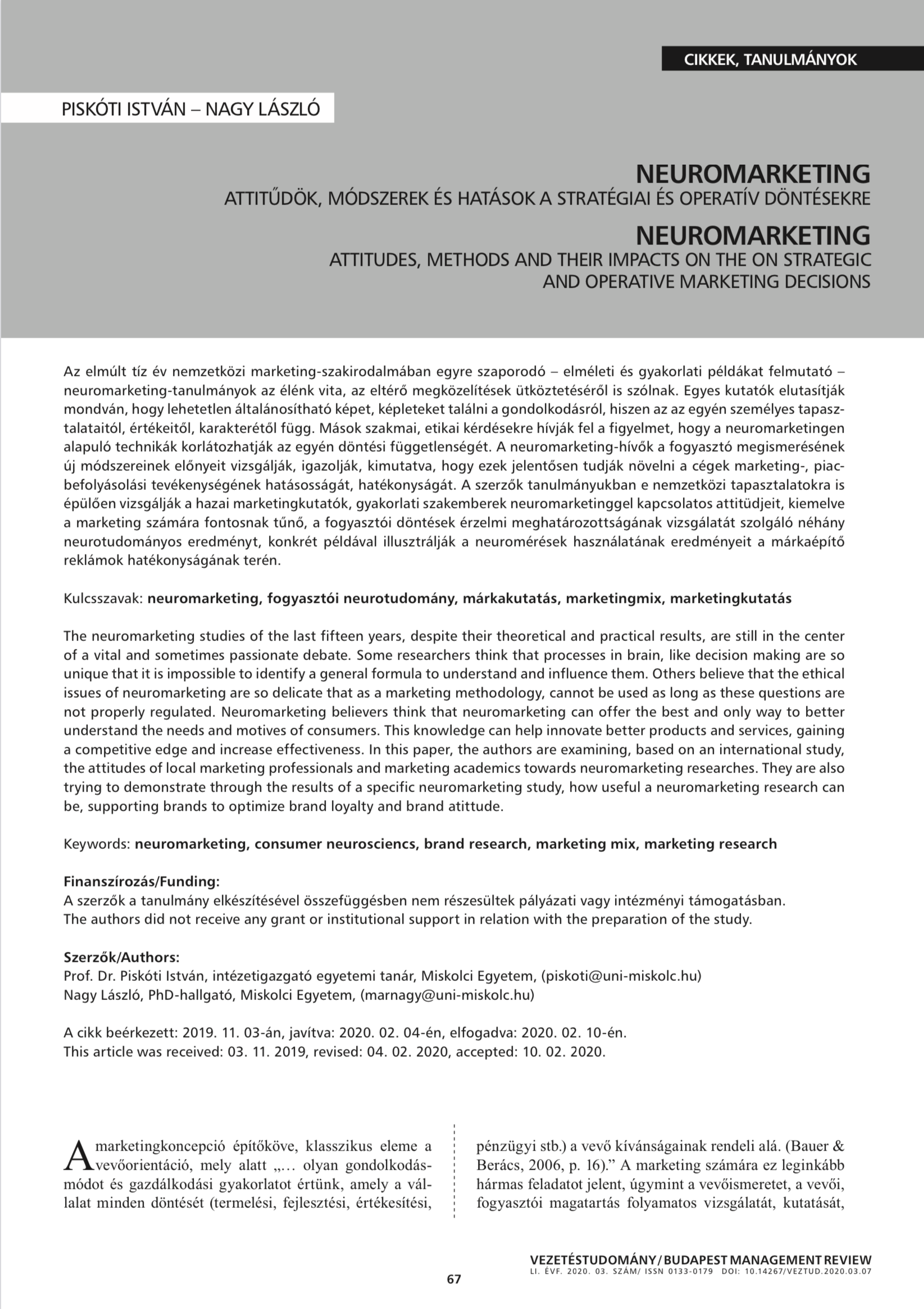Neuromarketing attitűdök, módszerek és hatások a stratégiai és operatív döntésekre
DOI:
https://doi.org/10.14267/VEZTUD.2020.03.07Kulcsszavak:
neuromarketing, fogyasztói neurotudomány, márkakutatás, marketingmix, marketingkutatásAbsztrakt
Az elmúlt tíz év nemzetközi marketing-szakirodalmában egyre szaporodó – elméleti és gyakorlati példákat felmutató – neuromarketing-tanulmányok az élénk vita, az eltérő megközelítések ütköztetéséről is szólnak. Egyes kutatók elutasítják mondván, hogy lehetetlen általánosítható képet, képleteket találni a gondolkodásról, hiszen az az egyén személyes tapasztalataitól, értékeitől, karakterétől függ. Mások szakmai, etikai kérdésekre hívják fel a figyelmet, hogy a neuromarketingen alapuló technikák korlátozhatják az egyén döntési függetlenségét. A neuromarketing-hívők a fogyasztó megismerésének új módszereinek előnyeit vizsgálják, igazolják, kimutatva, hogy ezek jelentősen tudják növelni a cégek marketing-, piacbefolyásolási tevékenységének hatásosságát, hatékonyságát. A szerzők tanulmányukban e nemzetközi tapasztalatokra is épülően vizsgálják a hazai marketingkutatók, gyakorlati szakemberek neuromarketinggel kapcsolatos attitüdjeit, kiemelve a marketing számára fontosnak tűnő, a fogyasztói döntések érzelmi meghatározottságának vizsgálatát szolgáló néhány neurotudományos eredményt, konkrét példával illusztrálják a neuromérések használatának eredményeit a márkaépítő reklámok hatékonyságának terén.
Letöltések
Hivatkozások
Ariely, D., & Berns, G. S. (2010). Neuromarketing: the hope and hype of neuroimaging in business. Nature Reviews Neuroscience, 11(4), 284. https://doi.org/10.1038/nrn2795
Bauer, A., & Berács, J.(2006). Marketing. Budapest: Aula Kiadó.
Bischof, N. (2009). Psychologie: Ein Grundkurs für Anspruchsvolle. Stuttgart: Kohlhammer.
Burmann, C., & Boch, S. (2010). Implikationen neuroökonomischer Forschungsergebnisse für die identitätsbasierte Führung von FMCGPremiummarken. In Lehrstuhl für Innovatives Markenmanagement (LiM) (pp. 1-94). Bremen: Universität Bremen.
Butler, M. J. (2008). Neuromarketing and the perception of knowledge. Journal of Consumer Behaviour, 7(4-5), 415-419. https://doi.org/10.1002/cb.260
Esch, F.-R. (2008). Strategie und Technik der Markenführung (5. A ufl.). M ünchen: Vahlen. https://doi.org/10.15358/9783800648573
Eser, Z., Isin, F. B., & Tolon, M. (2011). Perceptions of marketing academics, neurologists, and marketing professionals about neuromarketing. Journal of Marketing Management, 27(7-8), 854-868. https://doi.org/10.1080/02672571003719070
Fortunato, V. C. R., Giraldi, J. D. M. E., & de Oliveira, J. H. C. (2014). A review of studies on neuromarketing: Practical results, techniques, contributions and limitations. Journal of Management Research, 6(2), 201. https://doi.org/10.5296/jmr.v6i2.5446
French, J. R., Raven, B., Cartwright, D., & Zander, A. F. (1968). The bases of social power. In Cartwright, D. & Zander, A.F. (Eds.), Group Dynamics (pp. 607–623). Evanston, Ill.: Row Peterson.
Fugate, D. L. (2008). Marketing services more effectively with neuromarketing research: A look into the future. Journal of Services Marketing, 22(2), 170-173. https://doi.org/10.1108/08876040810862903
Gernsheimer, O., Raab, G., & Schindler, M. (2009). Einführung in die Welt des Neuromarketing. In Neuromarketing. Grundlagen–Erkenntnisse–Anwendungen (pp.1-28). W iesbaden: G abler. https://doi.org/10.1007/978-3-8349-8364-0_1
Häusel, H.-G. (2008). Brain View (2. Aufl.). Planegg/München: Rudolf Haufe.
Held, D., & Scheier, C. (2013). Was Marken erfolgreich macht: Neuropsychologie in der Markenführung (Vol.97). Freiburg: Haufe-Lexware.
Hubert, M., & Kenning, P. (2008). A current overview of consumer neuroscience. Journal of Consumer Behaviour, 7(4-5), 272-292. https://doi.org/10.1002/cb.251
Hubert, M. (2010). Does neuroeconomics give new impetus to economic and consumer research? Journal of Economic Psychology, 31(5), 812-817. https://doi.org/10.1016/j.joep.2010.03.009
Javor, A., Koller, M., Lee, N., Chamberlain, L., & Ransmayr, G. (2013). Neuromarketing and consumer neuroscience: contributions to neurology. BMC Neurology, 13(1), 13. https://doi.org/10.1186/1471-2377-13-13
Kahneman, D. (2003). A perspective on judgment and choice: mapping bounded rationality. American Psychologist, 58(9), 697-720. https://doi.org/10.1037/0003-066x.58.9.697
Ketskeméty, L., Izsó, L., & Könyves Tóth, E. (2011). Bevezetés az IBM SPSS Statistics programrendszerbe. Budapest: Artéria Stúdió Kft.
Klucharev, V., Smidts, A., & Fernández, G. (2008). Brain mechanisms of persuasion: how ‘expert power’modulates memory and attitudes. Social Cognitive and Affective Neuroscience, 3(4), 353-366. https://doi.org/10.1093/scan/nsn022
Krähe, J.(2009). Erkenntnisse des Neuromarketing für die Positionierung von Marken – dargestellt anhand von Beispielen ( Thesis). B erufsakademie G öttingen, Göttingen. Retrieved from https://www.vwagoettingen.de/assets/media/Kraehe_Julia_Thesis.PDF
Lee, N., Broderick, A. J., & Chamberlain, L. (2007). What is ‘neuromarketing’? A discussion and agenda for future research. International Journal of Psychophysiology, 63(2), 199-204. https://doi.org/10.1016/j.ijpsycho.2006.03.007
Marci, C. D. (2008). Minding the gap: The evolving relationships between affective neuroscience and advertising research. International Journal of Advertising, 27(3), 473-475.
McClure, S. M., Li, J., Tomlin, D., Cypert, K. S., Montague, L. M., & Montague, P. R. (2004). Neural correlates of behavioral preference for culturally familiar drinks. Neuron, 44(2), 379-387. https://doi.org/10.1016/j.neuron.2004.09.019.
Meaningful Brand Study (2017) http://dk.havas.com/wp-content/uploads/sites/37/2017/02/mb17_brochure_final_web.pdf
Morin, C. (2011). Neuromarketing: the new science of consumer behavior. Society, 48(2), 131-135. https://doi.org/10.1007/s12115-010-9408-1
Nufer,G., & Wallmeier,M.(2010): Neuromarketing (Working Papers on Marketing + Management Nr. 6.). Reutlingen: Hochschule Reutlingen.
Perrachione, T. K., & Perrachione, J. R. (2008). Brains and brands: Developing mutually informative research in neuroscience and marketing. Journal of Consumer Behaviour: An International Research Review, 7(4-5), 303-318. https://doi.org/10.1002/cb.253
Plassmann, H., Ramsøy, T. Z., & Milosavljevic, M. (2012). Branding the brain: A critical review and outlook. Journal of Consumer Psychology, 22(1), 18-36. https://doi.org/10.1016/j.jcps.2011.11.010
Plassmann, H., Venkatraman, V., Huettel, S., & Yoon, C. (2015). Consumer neuroscience: applications, challenges, and possible solutions. Journal of Marketing Research, 52(4), 4 27-435. https://doi.org/10.1509/jmr.14.0048
Polereczki, Z. (2015). Neuromarketing – A fogyasztói magatartás vizsgálatának új lehetőségei. Táplálkozásmarketing, 2(1), 51-57. https://doi.org/10.20494/tm/2/1/6
Pradeep, A. (2010). The buying brain: secrets for selling to the subconscious mind. Hoboken, New Jersey, USA: Wiley & Sons, Inc.
Renvoisé, P., & Morin, C. (2007). Neuromarketing: Understanding the buy buttons in your customer's brain. London: HarperCollins Leadership.
Rossiter, J. R., & Bellman, S. (2005). Marketing communications: Theory and applications. Upper- Saddle River: Prentice-Hall.
Smidts, A., Hsu, M., Sanfey, A. G., Boksem, M. A., Ebstein, R. B., Huettel, S. A., ... Liberzon, I. (2014). Advancing consumer neuroscience. Marketing Letters, 25(3), 257-267. https://doi.org/10.1007/s11002-014-9306-1
Young, F. W., & Null, C. H. (1978). Multidimensional scaling of nominal data: the recovery of metric information with ALSCAL. Psychometrika, 43(3), 367-379. https://doi.org/10.1007/bf02293646
Varga, Á. (2016). Neuromarketing, a marketingkutatás új iránya. Vezetéstudomány, 47(9), 55-63.
Vargas-Hernández, J. G., & Christiansen, B. (2014). Neuromarketing as a Business Strategy. In Handbook of Research on Effective Marketing in Contemporary Globalism (pp. 146-155). Hershey, PA: IGI Global.https://doi.org/10.4018/978-1-4666-6220-9.ch009
Wilson, R., Gaines, J., & Hill, R. P. (2008). Neuromarketing and consumer free will. Journal of Consumer Affairs, 42(3), 389-410. https://doi.org/10.1111/j.1745-6606.2008.00114.x

Downloads
Megjelent
Hogyan kell idézni
Folyóirat szám
Rovat
License
Authors assign copyright to Vezetéstudomány / Budapest Management Review. Authors are responsible for permission to reproduce copyright material from other sources.

